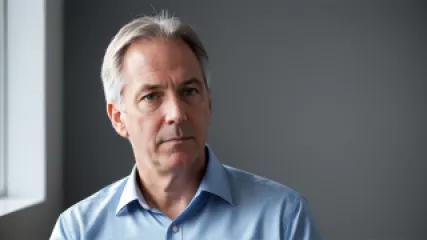Improving Mental Health: Understanding Resistance Through an Expert Interview
Improving Mental Health: Understanding Resistance Through an Expert Interview
In our quest to enhance emotional well-being and improve mental health, we often encounter a formidable obstacle: resistance. This complex psychological phenomenon can hinder our progress, derail our efforts, and leave us feeling frustrated and discouraged. To shed light on this pervasive challenge, we've had the privilege of speaking with Steve Jackson, a renowned mental health coach and author who has dedicated his career to helping individuals overcome resistance and unlock their full potential.
Unpacking the Roots of Resistance
As we delve into the depths of resistance, Steve explains that this phenomenon is deeply rooted in our psyche, stemming from a complex interplay of various factors. "Resistance is often a protective mechanism," he begins, "a way for our subconscious mind to shield us from perceived threats or unwanted change."
He goes on to elucidate that resistance can manifest in various forms, from procrastination and avoidance to self-sabotage and emotional withdrawal. "At its core, resistance is a defense mechanism, a way for our brain to maintain the status quo and avoid the discomfort of confronting our fears or stepping out of our comfort zones."
The Paradox of Resistance
One of the most perplexing aspects of resistance, Steve notes, is its inherent paradox. "Ironically, the very thing that is intended to protect us can ultimately hold us back from achieving our goals and realizing our true potential." He explains that while resistance may provide a sense of security in the short term, it can ultimately impede our personal growth, stifle our creativity, and limit our ability to adapt and thrive in the face of life's challenges.
This paradox, he adds, is particularly evident in the realm of mental health. "When we're struggling with issues like anxiety, depression, or trauma, resistance can become a formidable obstacle to our healing and recovery. We may unconsciously resist seeking help, changing unhealthy patterns, or confronting the root causes of our emotional distress."
Navigating the Complexities of Resistance
Recognizing the multifaceted nature of resistance, Steve emphasizes the importance of developing a nuanced understanding of this phenomenon. "Resistance is not something to be fought or conquered; it's a natural human response that deserves our compassion and understanding."
He suggests that the key to effectively navigating resistance lies in cultivating self-awareness and adopting a non-judgmental approach. "Instead of berating ourselves for 'giving in' to resistance, we need to approach it with curiosity and empathy. What is our resistance trying to protect us from? What deeper fears or beliefs are driving this response?"
Embracing Resistance as a Catalyst for Growth
Far from being a mere obstacle, Steve believes that resistance can actually serve as a powerful catalyst for personal growth and transformation. "When we're able to recognize and engage with our resistance in a constructive way, we can harness its energy and use it to propel us forward."
He suggests that by cultivating a deeper understanding of our resistance, we can learn to reframe it as an opportunity for self-discovery and healing. "Instead of viewing resistance as something to be conquered, we can see it as a gateway to greater self-awareness and emotional resilience. By leaning into our resistance, we can uncover the underlying beliefs, fears, and patterns that have been holding us back, and ultimately, transcend them."
Practical Strategies for Overcoming Resistance
Throughout our conversation, Steve shares a wealth of practical strategies and techniques that individuals can employ to navigate the challenges of resistance and foster lasting change in their lives. These include:
- Mindfulness and self-reflection: Developing a deeper awareness of our thoughts, emotions, and bodily sensations can help us identify the roots of our resistance and respond to it with greater clarity and compassion.
- Gradual exposure and small steps: Tackling resistance head-on can be overwhelming, so it's often more effective to approach it in a gradual, step-by-step manner, taking small, manageable actions that gradually build momentum.
- Seeking support and accountability: Enlisting the help of a trusted mental health professional, coach, or support network can provide the guidance, encouragement, and accountability needed to overcome resistance.
- Reframing negative self-talk: Replacing self-critical inner dialogues with more compassionate, affirming messages can help counteract the negative thought patterns that often fuel resistance.
- Cultivating self-compassion: Treating ourselves with kindness and understanding, rather than judgment and harsh criticism, can significantly alleviate the emotional burden of resistance and foster a more constructive approach to personal growth.
The Transformative Power of Embracing Resistance
As our conversation draws to a close, Steve emphasizes the transformative power that can arise from embracing resistance, rather than simply trying to overcome it. "When we learn to approach resistance with curiosity, empathy, and a willingness to engage with it, we open ourselves up to a world of personal discovery and growth."
He shares that by reframing resistance as a catalyst for change, individuals can unlock new levels of self-awareness, emotional resilience, and the courage to pursue their most meaningful goals and aspirations. "Resistance is not the enemy; it's a gateway to a deeper understanding of ourselves and the opportunity to transcend our limitations."
In the end, Steve's insights offer a powerful invitation to embrace the complexities of resistance, to view it as a necessary part of the journey towards improved mental health and personal fulfillment. By cultivating a compassionate and curious approach to this often-daunting challenge, we can harness the transformative potential that lies at the heart of our resistance, and ultimately, unlock our full potential for growth and well-being.
Remember, if you or someone you know is struggling with mental health challenges, it's important to seek professional help. Online counseling services like BetterHelp and Talkspace can provide accessible and affordable support. And always remember, you're not alone – there are resources and people who can help you navigate the path to improved mental health and emotional well-being.






